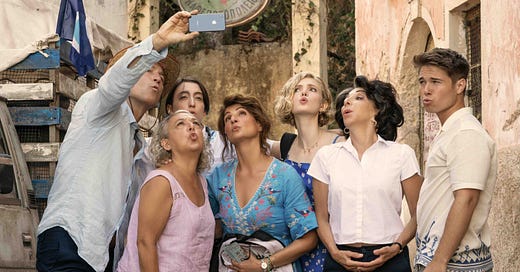My Big Fat Greek Wedding 3
Heaping helpings of romance, food, familial squabbling and broad comedy are on the menu as Toula and the gang set out for a reunion in the home country.
Given the premise of “My Big Fat Greek Wedding 3,” I think anybody in the audience could write the script about the same way as star/writer Nia Vardalos, who also assumes directing duties this go-round. There are lots of smiles but few surprises.
For those not up to speed: 20 years ago frumpy old maid Toula (Vardalos) struggled to find romance, especially under the suffocating hectoring of her close-knit Greek family. But eventually she found love with dreamy teacher Ian (John Corbett). Things continued into middle age and parenthood with the 2016 sequel, about which, like the shameful cousin every family seems to have, the less said the better.
Now family patriarch Gus has passed away, and Toula and her aggressively manscaping brother Nick (Louis Mandylor) have agreed to travel back to the home country and their father’s tiny village. There they hope to reunite with dad’s three best friends and pass along to them his journal of his life in America.
Of course, half the family is tagging along as well, including nosy aunts Voula (Andrea Martin) and Frieda (Maria Vacratsis). They’re also bringing their daughter, Paris (Elena Kampouris), now an anxious freshman at NYU. Wouldn’t you know, her (brief) college flame, Aristotle (Elias Kacavas), is brought along as a hired assistant for Voula. And you just know pushy cousins Nikki (Gia Carides) and Angelo (Joey Fatone) are going to turn up at some point.
Story? There really isn’t one. They find pop’s old village virtually deserted, seemingly populated only by a grouchy old woman, Alexandra (Anthi Andreopoulou), and an exuberant young intersex person named Victory (Melina Kotselou) who has declared themselves mayor of the town, and nobody cares enough to object.
You know what’s on the menu: romance, food, sunny Greek vistas, friendly family squabbling, and lots and lots of very broad comedy. If this was a Jewish clan, I’d call it Borsht Belt. Souvlaki slapstick?
Alexandra instructs Ian to pick which chicken they will eat for dinner. When he declares himself a vegetarian, she simply stares daggers and says, “No.” Voula and Frieda energetically interject themselves into rekindling Paris and Aristotle’s romance. Toula sets about trying to find her father’s friends, without much success.
There really isn’t much about Ian and Toula’s relationship, after being the centerpiece of the first two movies. They’re now old marrieds, comfortable and still very much in love. Ian has learned to flow with the wavering rhythms of Greek familial strife, happily embracing his role in the background. Toula struggles with now being the head of the family, after once being its least member.
(I’ll pause here to comment on how Vardalos and Corbett, now age 60 and 62, respectively, are somehow an even more gorgeous couple than in the first movie. Whatever they’re cooking, I want a taste.)
More focus is spent on Paris’ troubles, plus that of Alexandra’s son, who is scandalously carrying on with her Syrian helper. There is also a stranger keeping tabs on Toula and her crew (played by Alexis Georgoulis), who will later assume an unexpected role in the family drama.
It’s all a rather slender reed upon which to balance an entire movie, and “MBFGW3” occasionally drags from a lack of narrative momentum, despite a slim 91-minute run time.
There’s some subtext about the changing roles of women throughout their lives, and especially about how Greek (or any) mothers feel pressured to be the fountain of caretaking for everybody else. Toula’s own mom, Maria (Lainie Kazan), stays home for this trip, now in the latter stages of dementia.
I wish the movie had focused more on Toula and her plight, witnessing her kid struggle with her old issues while worrying about her own mother, who’s dealing with stuff she will face herself soon enough.
But this flick is all about crowd-pleasing, easy laughs based on ethnic stereotypes and sun-dappled good times. It’s not quite enough for me, but the Welsh have always been a dour lot.





